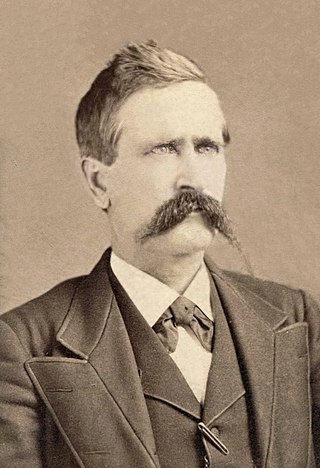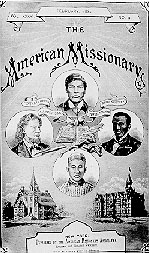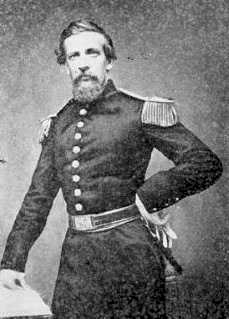
The 1888 United States presidential election was the 26th quadrennial presidential election, held on Tuesday, November 6, 1888. Republican nominee Benjamin Harrison, a former Senator from Indiana, defeated incumbent Democratic President Grover Cleveland of New York. It was the third of five U.S. presidential elections in which the winner did not win the national popular vote, which would not occur again until the 2000 US presidential election.

Francis Marion Cockrell was a Confederate military commander and American politician from the state of Missouri. He served as a United States senator from Missouri for five terms. He was a prominent member of the famed South–Cockrell–Hargis family of Southern politicians.

John Pierce St. John was an American politician who served as the eighth Governor of Kansas and later served as the Prohibition presidential nominee in 1884. Under his tenure as governor Kansas became the third state to enact a statewide prohibition of alcohol which would last until 1948 and remain in some form until 1987. After leaving elected office he maintained his position in the Prohibition party and remained active in the party's presidential politics and was a major figure in the party schism during the 1896 presidential election.

Nelson Appleton Miles was a United States Army officer who served in the American Civil War, the American Indian Wars and the Spanish–American War. From 1895 to 1903, Miles served as the last Commanding General of the United States Army, before the office was transformed into the Chief of Staff of the Army.

The American Missionary Association (AMA) was a Protestant-based abolitionist group founded on September 3, 1846 in Albany, New York. The main purpose of the organization was abolition of slavery, education of African Americans, promotion of racial equality, and spreading Christian values. Its members and leaders were of both races; The Association was chiefly sponsored by the Congregationalist churches in New England. The main goals were to abolish slavery, provide education to African Americans, and promote racial equality for free Blacks. The AMA played a significant role in several key historical events and movements, including the Civil War, Reconstruction, and the Civil Rights Movement.

John Stevens Bowen was a career United States Army officer who later became a general in the Confederate Army and a commander in the Western Theater of the American Civil War. He fought at the battles of Shiloh, Corinth, and the Vicksburg Campaign. He is often said to have died just as his abilities were gaining attention.

This is a selected bibliography of the main scholarly books and articles of Reconstruction, the period after the American Civil War, 1863–1877.
Earle Harold Munn was an American politician who served as the chairman of the Prohibition Party. With the Prohibition Party, he ran as a third-party candidate for President and Vice President of the United States.

Brigadier-General George Earl Maney was an American soldier, politician, railroad executive and diplomat. He was a general in the Confederate States Army during the American Civil War and a postbellum U.S. ambassador to Colombia, Bolivia, Uruguay, and Paraguay.

Erastus Milo Cravath (1833–1900) was a pastor and American Missionary Association (AMA) official who after the American Civil War, helped found Fisk University in Nashville, Tennessee, and numerous other historically black colleges in Georgia and Tennessee for the education of freedmen. He also served as president of Fisk University for more than 20 years.
Edward Parmelee Smith (1827–1876) was a Congregational minister in Massachusetts before becoming Field Secretary for the United States Christian Commission during the American Civil War. In official positions with the American Missionary Association (AMA), he was a co-founder of Fisk University and other historically black colleges established in the South for the education of freedmen. Beginning in 1873, he served as commissioner of Indian Affairs under President Ulysses S. Grant. In 1875, he was selected president of Howard University, but died on a trip in Africa in 1876 before taking office.

John Anderson Brooks was a religious scholar and prohibitionist who served as the Prohibition Party's vice presidential nominee during the 1888 presidential election.
African Americans are the second largest census "race" category in the state of Tennessee after whites, making up 17% of the state's population in 2010. African Americans arrived in the region prior to statehood. They lived both as slaves and as free citizens with restricted rights up to the Civil War.

The 1888 United States presidential election in Georgia took place on November 6, 1888, as part of the wider United States presidential election. Voters chose 12 representatives, or electors, to the Electoral College, who voted for president and vice president.

The 1888 United States presidential election in Tennessee took place on November 6, 1888, as part of the 1888 United States presidential election. Tennessee voters chose 12 representatives, or electors, to the Electoral College, who voted for president and vice president. For over a century after the Civil War, Tennessee’s white citizenry was divided according to partisan loyalties established in that war. Unionist regions covering almost all of East Tennessee, Kentucky Pennyroyal-allied Macon County, and the five West Tennessee Highland Rim counties of Carroll, Henderson, McNairy, Hardin and Wayne voted Republican – generally by landslide margins – as they saw the Democratic Party as the “war party” who had forced them into a war they did not wish to fight. Contrariwise, the rest of Middle and West Tennessee who had supported and driven the state’s secession was equally fiercely Democratic as it associated the Republicans with Reconstruction. After the state’s white landowning class re-established its rule in the early 1870s, black and Unionist white combined to forge adequate support for the GOP to produce a competitive political system for two decades, although during this era the Republicans could only capture statewide offices when the Democratic Party was divided on this issue of payment of state debt.

The 1888 United States presidential election in North Carolina took place on November 6, 1888, as part of the 1888 United States presidential election. North Carolina voters chose 11 representatives, or electors, to the Electoral College, who voted for president and vice president.

Brigadier-General John Randolph Lewis was an American dentist, soldier, administrator, and postmaster, known for his work with the Freedmen's Bureau.

Alexander Warner was an American Union Army officer, banker, planter, and Republican politician. He was the 15th Secretary of State of Mississippi, the 44th State Treasurer of Connecticut, and a member of the Kansas House of Representatives.

John Ogden was an American military officer, minister, veteran educator, and abolitionist. He served in the Union Army during the American Civil War, being captured in 1864 and held prisoner until the conflict ended. He became an education official with the Freedmen's Bureau in Tennessee and co-founded a school for African Americans, Fisk School, that preceded Fisk University. He also served as the third North Dakota Superintendent of Public Instruction in the early 1890s.

Jason Elmer Hammond was an American educator and politician.

















